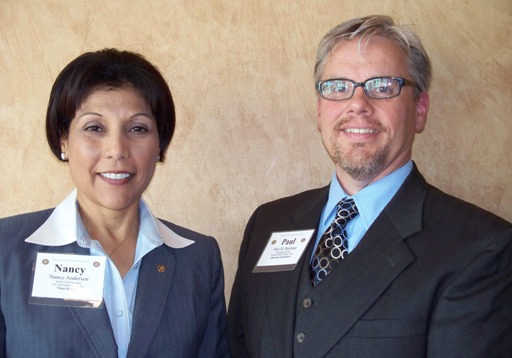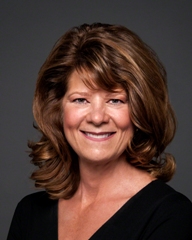SEP 3, 2013 ROTARY IN REVIEW:
Steve Nyhus
David Laird led Rotarians and visiting guests in singing America, My Country ‘Tis of Thee accompanied by Dennis Boom on the piano. Ken Peterson provided today’s invocation and talked about one of the best ways to keep worry at bay, stay in the present. Reminds me of the quote - “yesterday is history, tomorrow is a mystery, today is a gift, that’s why it’s called the present.” Bill Collins facilitated the introduction of visiting Rotarians and guests. Today’s Greeters were Jerry Faletti and Deb Vos.
Mike Franklin, chair of the Club 10 Public Relations Committee spoke on behalf of Program Committee Chair, Jay Pfaender, to introduce next week’s featured speaker, Brad Rixmann, Founder of Pawn America. Mr. Rixmann will share his business model and how it’s changing the stereotype of what a pawn store is and does. You won’t want to miss this presentation! Mike also encouraged our membership to “like” Rotary Club of Saint Paul on Facebook to continue promoting the club and all of activities. He predicted we could double the number of likes from 17 by the end of today’s meeting. Let’s help the guy out – I did!
 Another welcome back to the Club 10 today, Nancy Anderson, reintroduced Rotarian Paul DeGrest, nice to have you back in our midst! Vicki-Gee Treft gave an update on the schedule of our Friendship Exchange visitors from British Columbia from Tuesday, September 17 – Friday, September 20, 2013. Carla Hauge encouraged all Club 10 members to purchase 1 dozen Roses a piece for this year’s Rose sale to support the activities of our club. We are on the trellis for 12,000 dozen this year and she is looking for volunteers to sell roses in the skyway on September 26th and 27th, 2013.
Another welcome back to the Club 10 today, Nancy Anderson, reintroduced Rotarian Paul DeGrest, nice to have you back in our midst! Vicki-Gee Treft gave an update on the schedule of our Friendship Exchange visitors from British Columbia from Tuesday, September 17 – Friday, September 20, 2013. Carla Hauge encouraged all Club 10 members to purchase 1 dozen Roses a piece for this year’s Rose sale to support the activities of our club. We are on the trellis for 12,000 dozen this year and she is looking for volunteers to sell roses in the skyway on September 26th and 27th, 2013.
Mindee Kastelic was tapped again to introduce today’s speaker, Steve Nyhus, a Senior Attorney with the law firm Flaherty-Hood since 2000, his practice focuses on municipal wastewater treatment facilities (WWTF), municipal electric utility and real estate matters. Prior to joining the firm, Steve worked as a majority caucus researcher with the Minnesota House of Representatives and as committee administrator for the House Health and Human Services Policy Committee. He graduated summa cum laude from Minnesota State University-Moorhead in 1996 with a B.A. in political science and a minor in writing. He graduated from the University of Minnesota Law School and was admitted to the Minnesota State Bar in 1999. As Steve put it, “he’s found his happy place at the end of a sewer pipe.”
Steve’s presented: Clean Water, A Shared Responsibility. Founded more than two decades ago, Flaherty-Hood provides governmental relations services to cities in Greater Minnesota. Their focus is on city projects including property taxes, transportation, economic development, land use, labor and employment, real estate, and environment. Flaherty-Hood attorneys represent cities on wastewater treatment (WWTF) regulatory issues, on electric utility regulatory issues, on the acquisition of property, easements, and environmental review for development projects, helping to untangle the often times confusing legislation and regulations surrounding these issues. Steve walked us through the not so glamorous life of a wastewater treatment facility, built to meet community and industrial needs for up to 50 years. He walked us through what happens after you flush and the work of highly skilled and trained scientists and technicians that clarify, disinfect, and irradiate the wastewater until it reaches a treated level allowing it to be fishable/swimmable. Federal Clean Water Act of 1972 governs all discharge of wastewater, EPA delegates authority to states (MPCA) to set standards and permit discharges. WWTF’s must comply with federal and state regulations, including municipal, industrial point sources. Organizations out of compliance with state and/or federal regulations can be imposed fines of $10-12K a day. Did you know that agricultural run-off is not regulated?
Big picture issues surrounding water – standards/criteria for keeping surface waters fishable and swimmable; how best to manage urban stormwater runoff; making sure there’s enough groundwater and that it’s clean. Steve listed several chemicals that pose hazards to our water: Mercury, Phosphorus, Nitrogen, Chloride, Sulfate – plus other contaminants of emerging concern, “statistics would make your teeth curl.” 40% of Minnesota waters are impaired by at least one pollutant doesn’t mean that our water quality is getting worse, but the testing tools for contaminants are constantly improving.
Minnesota has 80 watershed districts. In 2013 legislation was enacted to provide Watershed Restoration and Protection Strategies – not only restore impaired waters, but ensure unimpaired waters stay that way. What can you do to help? Businesses can look at industrial processes where pollutants might be reduced; reduce/capture/slow down stormwater; work with suppliers and employees to evaluate the ingredients of cleaning products; contact the MN Technical Assistance Program. At home, the only things going into your toilet should be human waste and toilet paper – no baby wipes!
Medications should be rendered unusable and thrown into trash or taken to drop-off sites; keep leaves, grass clippings out of gutters; if you have a water softener, keep it well-tuned; consider reducing runoff – use rain barrels. Stay involved Find Your Watershed at www.pca.state.mn.us; find out about watershed WRAPS and TMDL activities in your area; get on the mailing list, attend a meeting … your opinions matter.
President Jim thanked Steve for his remarks and shared that a donation in his name would be made to the Saint Paul Public Library’s “Read With Me”  program. President Jim invited Steve to rejoin the club whenever his firm’s economics allow. He then adjourned the meeting at 1:30.
program. President Jim invited Steve to rejoin the club whenever his firm’s economics allow. He then adjourned the meeting at 1:30.
Beth Naughton, Scribe

